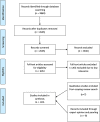Optimising a person-centred approach to stopping medicines in older people with multimorbidity and polypharmacy using the DExTruS framework: a realist review
- PMID: 36042454
- PMCID: PMC9429627
- DOI: 10.1186/s12916-022-02475-1
Optimising a person-centred approach to stopping medicines in older people with multimorbidity and polypharmacy using the DExTruS framework: a realist review
Erratum in
-
Correction: Optimising a person-centred approach to stopping medicines in older people with multimorbidity and polypharmacy using the DExTruS framework: a realist review.BMC Med. 2022 Oct 20;20(1):401. doi: 10.1186/s12916-022-02611-x. BMC Med. 2022. PMID: 36266686 Free PMC article. No abstract available.
Abstract
Background: Tackling problematic polypharmacy requires tailoring the use of medicines to individual circumstances and may involve the process of deprescribing. Deprescribing can cause anxiety and concern for clinicians and patients. Tailoring medication decisions often entails beyond protocol decision-making, a complex process involving emotional and cognitive work for healthcare professionals and patients. We undertook realist review to highlight and understand the interactions between different factors involved in deprescribing and to develop a final programme theory that identifies and explains components of good practice that support a person-centred approach to deprescribing in older patients with multimorbidity and polypharmacy.
Methods: The realist approach involves identifying underlying causal mechanisms and exploring how, and under what conditions they work. We conducted a search of electronic databases which were supplemented by citation checking and consultation with stakeholders to identify other key documents. The review followed the key steps outlined by Pawson et al. and followed the RAMESES standards for realist syntheses.
Results: We included 119 included documents from which data were extracted to produce context-mechanism-outcome configurations (CMOCs) and a final programme theory. Our programme theory recognises that deprescribing is a complex intervention influenced by a multitude of factors. The components of our final programme theory include the following: a supportive infrastructure that provides clear guidance around professional responsibilities and that enables multidisciplinary working and continuity of care, consistent access to high-quality relevant patient contextual data, the need to support the creation of a shared explanation and understanding of the meaning and purpose of medicines and a trial and learn approach that provides space for monitoring and continuity. These components may support the development of trust which may be key to managing the uncertainty and in turn optimise outcomes. These components are summarised in the novel DExTruS framework.
Conclusion: Our findings recognise the complex interpretive practice and decision-making involved in medication management and identify key components needed to support best practice. Our findings have implications for how we design medication review consultations, professional training and for patient records/data management. Our review also highlights the role that trust plays both as a central element of tailored prescribing and a potential outcome of good practice in this area.
Keywords: Deprescribing; Evidence synthesis; Person-centred care; Polypharmacy; Realist review.
© 2022. The Author(s).
Conflict of interest statement
KM is a member of the HTA PCCPI Panel (2018), HTA Prioritisation Committee A (Out of hospital) (2018–2023), HTA Prioritisation Committee A Methods Group (2018) and HTA Programme Oversight Committee (2018–2021). GW is a member of HTA PCCPI Panel (2015–2018), Pharmaceuticals Panel (2011–2015), HTA Prioritisation Committee A (Out of hospital) (2015–2021) and HTA Prioritisation Committee A Methods Group. DL is a member of the HTA Clinical Evaluation and Trials Committee (2016–2021). RH has delivered educational workshops on health economics, medicines management and HTA for cancer specialists supported by unrestricted sponsorship by the pharmaceutical industry and an industry association (March 2019). RH has not received fees personally, and these activities are not specific to the topic of this research.
Figures





Similar articles
-
What makes a multidisciplinary medication review and deprescribing intervention for older people work well in primary care? A realist review and synthesis.BMC Geriatr. 2023 Sep 25;23(1):591. doi: 10.1186/s12877-023-04256-8. BMC Geriatr. 2023. PMID: 37743469 Free PMC article. Review.
-
Deprescribing medicines in older people living with multimorbidity and polypharmacy: the TAILOR evidence synthesis.Health Technol Assess. 2022 Jul;26(32):1-148. doi: 10.3310/AAFO2475. Health Technol Assess. 2022. PMID: 35894932 Free PMC article. Review.
-
Development of a complex multidisciplinary medication review and deprescribing intervention in primary care for older people living with frailty and polypharmacy.PLoS One. 2025 Apr 22;20(4):e0319615. doi: 10.1371/journal.pone.0319615. eCollection 2025. PLoS One. 2025. PMID: 40261878 Free PMC article.
-
Medication management in older people: the MEMORABLE realist synthesis.Southampton (UK): NIHR Journals Library; 2020 Jun. Southampton (UK): NIHR Journals Library; 2020 Jun. PMID: 32579319 Free Books & Documents. Review.
-
The deprescribing rainbow: a conceptual framework highlighting the importance of patient context when stopping medication in older people.BMC Geriatr. 2018 Nov 29;18(1):295. doi: 10.1186/s12877-018-0978-x. BMC Geriatr. 2018. PMID: 30497404 Free PMC article.
Cited by
-
Prevalence and trends of polypharmacy in U.S. adults, 1999-2018.Glob Health Res Policy. 2023 Jul 12;8(1):25. doi: 10.1186/s41256-023-00311-4. Glob Health Res Policy. 2023. PMID: 37434230 Free PMC article.
-
What makes a multidisciplinary medication review and deprescribing intervention for older people work well in primary care? A realist review and synthesis.BMC Geriatr. 2023 Sep 25;23(1):591. doi: 10.1186/s12877-023-04256-8. BMC Geriatr. 2023. PMID: 37743469 Free PMC article. Review.
-
Intrinsic Capacity Impairment Patterns and their Associations with Unfavorable Medication Utilization: A Nationwide Population-Based Study of 37,993 Community-Dwelling Older Adults.J Nutr Health Aging. 2022;26(10):918-925. doi: 10.1007/s12603-022-1847-z. J Nutr Health Aging. 2022. PMID: 36259580 Free PMC article.
-
Determinants of and interventions for Proton Pump Inhibitor prescription behavior: A systematic scoping review.BMC Prim Care. 2024 Jun 11;25(1):208. doi: 10.1186/s12875-024-02459-5. BMC Prim Care. 2024. PMID: 38862886 Free PMC article.
-
Correction: Optimising a person-centred approach to stopping medicines in older people with multimorbidity and polypharmacy using the DExTruS framework: a realist review.BMC Med. 2022 Oct 20;20(1):401. doi: 10.1186/s12916-022-02611-x. BMC Med. 2022. PMID: 36266686 Free PMC article. No abstract available.
References
-
- Duerden M, Avery T, Payne R. Polypharmacy and medicines optimisation: making it safe and sound. London; 2013. Available from: www.kingsfund.org.uk
Publication types
MeSH terms
Grants and funding
LinkOut - more resources
Full Text Sources

